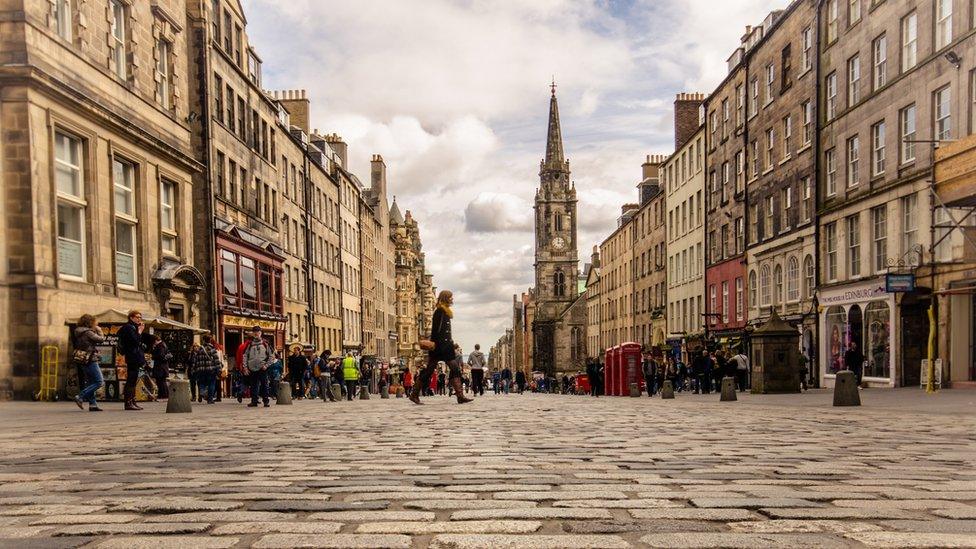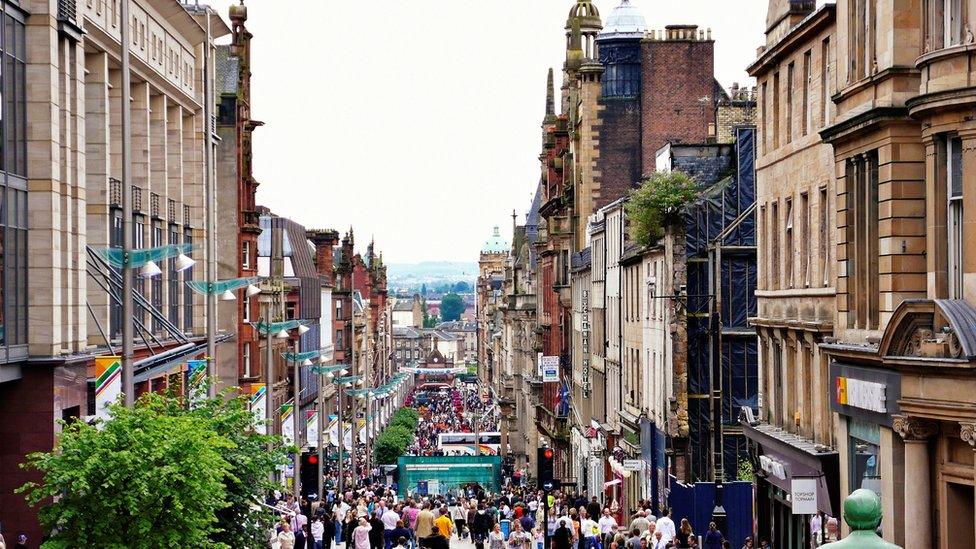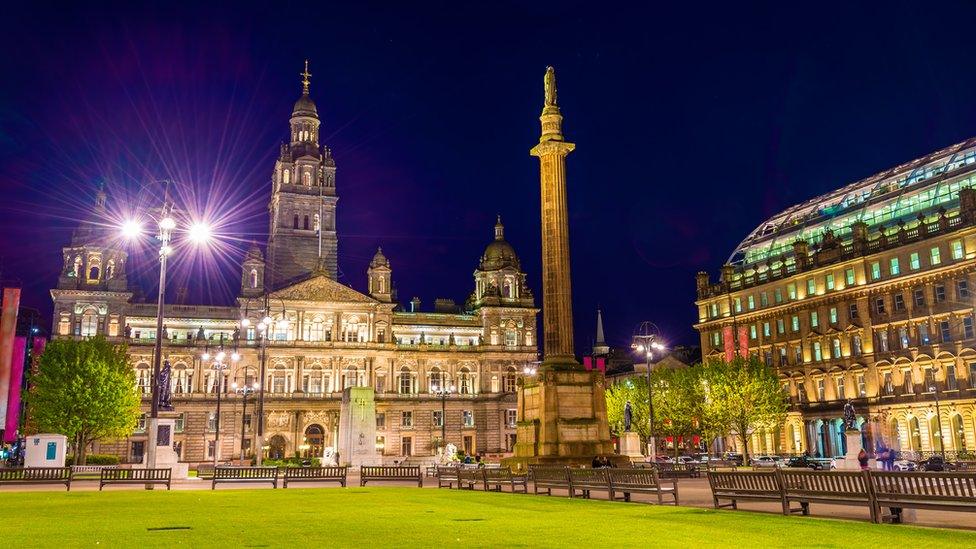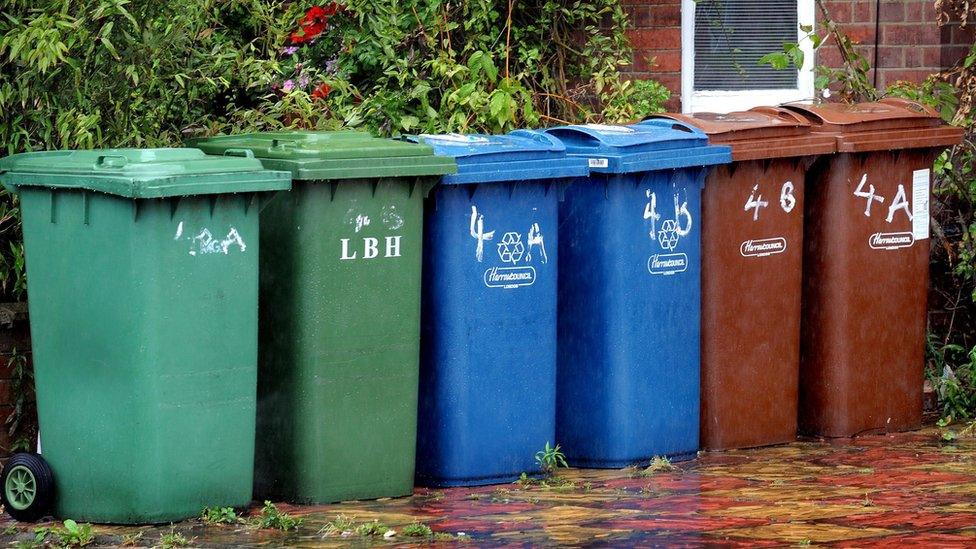What can we expect from this year's council elections?
- Published

Will voters be interested in local or national issues at this year's local authority elections?
After a year of monumental political change, the focus this year may turn briefly to more mundane, bread and butter issues.
Scotland's council elections take place on 4 May. All of the 1,220 or so seats in Scotland's 32 local authorities are up for grabs.
Councils play a big role in a huge range of local services such as schools, social work and rubbish collections.
But will voters be interested in local or national issues? And will the SNP come to dominate local government in the way it currently dominates Scottish national politics?
At the last council elections in 2012 Labour and the SNP weren't that far apart.
The SNP got the most first preference votes and got the most councillors. But the gap was relatively narrow while the complexities of coalition politics mean Labour is actually the most powerful party in Scottish local government.
Labour fortresses
In central and southern Scotland Labour is part of the administration in all but five councils (Argyll and Bute, Scottish Borders, East Ayrshire, South Ayrshire and Midlothian).
In the northern half of Scotland the picture is much more mixed. The SNP enjoys a powerbase in Tayside with overall majorities in Dundee and Angus. Traditionally independents play a significant role in parts of the Highlands and islands and some rural areas.
Top targets for the SNP include some of Labour's fortresses such as Glasgow and North Lanarkshire where Labour has overall majorities.
The party will also be looking to regain control of councils including Renfrewshire and West Dunbartonshire where Labour has been in charge since 2012.
Many council by-election results over the past two years give SNP supporters grounds for confidence although it can be difficult to draw firm conclusions given the relatively modest turnout or the fact that local factors may be at play.

The SNP will be looking to target Labour strongholds like Glasgow
North Ayrshire will also be worth keeping a watch on: the SNP administration recently resigned following a by-election loss, much to the surprise of local Labour councillors who now form the administration.
Of course, as is always the case with PR systems, if nobody has an overall majority there is no guarantee that the largest party in a council will form the administration - there is no rule, or even convention, that the largest group should be in power although this is usually the case. In Stirling, Labour and the Conservatives have been in control for five years even though the SNP has the most councillors.
But since 2012 there have been seismic shifts in the broader political landscape.
The surge in SNP membership after the independence referendum and the party's landslide in the Westminster election of 2015. The SNP took 56 of Scotland's 59 constituencies including many which were once considered Labour fiefdoms.
The emergence of the Scottish Conservatives as the second party at Holyrood. They believe they are well on the way to re-establishing themselves as the main political force in the areas of Scotland where they traditionally enjoyed high levels of support - rural areas and the suburbs.
Those factors are bound to give the SNP and the Conservatives optimism and cause Labour concern. Meanwhile the Liberal Democrats will be hoping to recover from their poor 2012 performance. But in local elections, will people be voting on national or local issues?


Result of Scotland's 2012 council election
Cons - 13%
Lab - 31%
Lib Dem 6%
SNP - 32%
Ind - 12%
Green - 2%.
Number of councillors elected in 2012
Con 115
Lab 394
Lib Dem 71
SNP 425
Ind 200
Green 6
Others 4
Note: Totals will have changed since 2012 through by elections.

At the last council elections just 39% of people voted. The council elections in 1999, 2003 and 2007 took place on the same day as the Holyrood elections, boosting turnout. But there was a concern that local issues were completely overshadowed by the Holyrood campaigns. The uncoupling led, as expected, to a significant fall in turnout but arguably led to campaigns more clearly focused on local issues.
The events of recent years have led to a re-engagement with politics among some people who might previously have been unenthusiastic. But will this lead to a significant jump in the local election turnout?
The past few years have been tough financially for local government. As a general rule, councils have attempted to avoid immediately obvious cuts in the most widely-used services and made cuts behind the scenes or in very specific areas.
There is no doubt that people can be passionate about bread and butter issues which affect their lives: changes to bin collections, school closures, potholes. They can be equally passionate too if, say, a popular service they know or use is threatened with closure. But how many people feel so passionate about a service they do not use personally even if they may understand its importance to others?

Might a council tax freeze impress some voters?
As a general rule, the better off someone is the less likely they are to be personally dependent on a council service. The council services they benefit from will be those designed for the community as a whole: lights, roads, libraries. Schools are likely to be the only council service which many better off people feel a direct, personal connection with.
Social services also take up a large chunk of council budgets. But, by definition, many of the people who rely on these services are likely to be vulnerable or economically disadvantaged to begin with. Their stories can sometimes be invisible to others and the work of council staff in these fields rarely makes the headlines unless something goes wrong.
For many voters who do not rely personally on council services, the simple cost of paying for them might be an important factor.
The council tax freeze ends this year. Councils will be able to put up bills for everyone by up to 3% while those whose homes are in the higher property bands will automatically see increases because of changes to the way their bills are calculated.
'Mid-term verdicts'
Some better off voters may see significant increases as a result of the two changes put together.
Fewer than a third of councils have so far indicated that they are likely to put up council tax by 3%. One - Labour-run South Lanarkshire - intends to freeze bills for a further year and there is speculation more authorities might follow.
Might a local council tax freeze impress some voters?
A council may argue that it was demonstrating efficiency - or concerned that even the modest rise that the majority of voters would face could be unpopular. On the other hand, critics would say a rise could at least mitigate cuts.
Given the speed of political developments in recent months, a lot could happen in national politics before May's local elections.
Historically, local elections have been called mid-term verdicts on national governments. Supporters of local democracy will be hoping that, whatever may happen at Westminster or Holyrood, voters will spend a few weeks thinking about local services and how they should be paid for and delivered.
- Published22 December 2016
